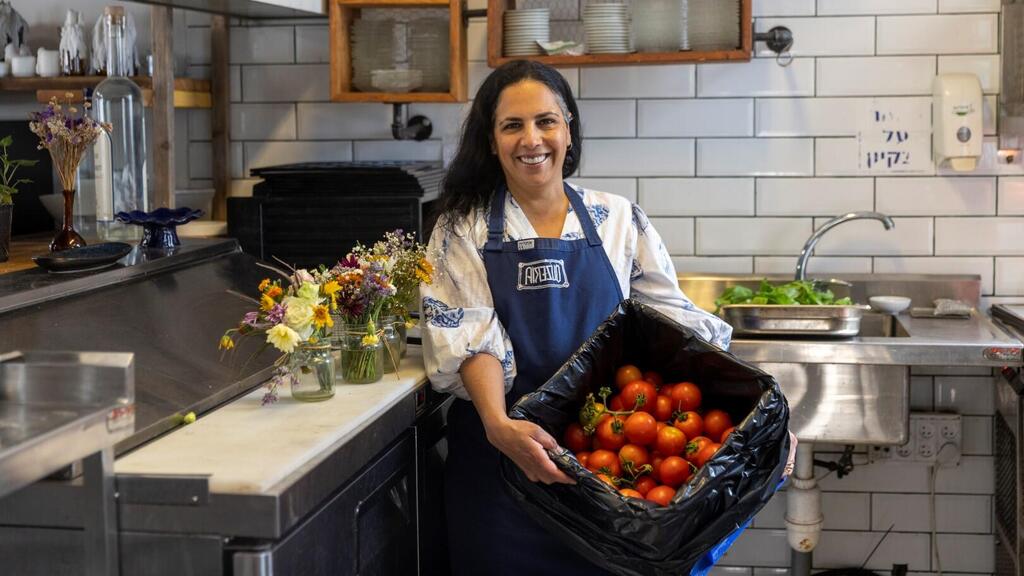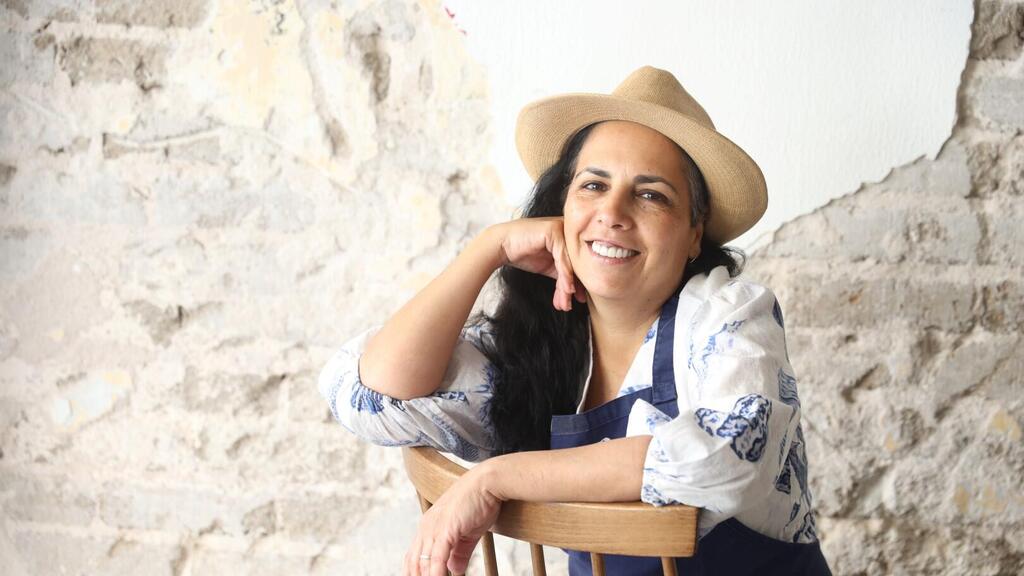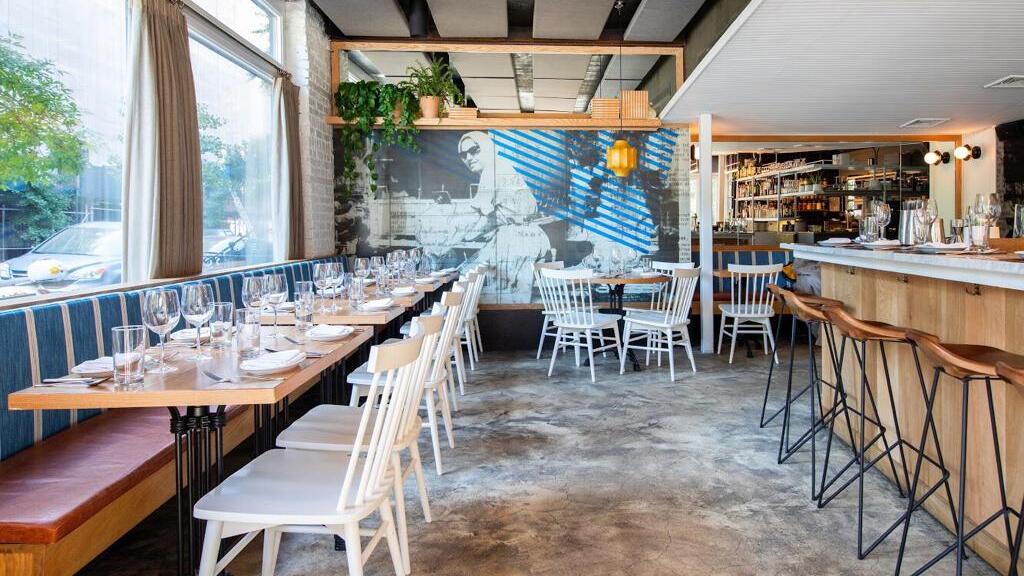She started 2020 with debts from here to Times Square. At the beginning of that year, she closed Kish Kash, her couscous restaurant that operated for three years in New York, serving North African food to Americans.
- More Stories:
It was the first place in New York to make couscous using the traditional method - rolling by hand. But the restaurant of former Israeli chef Einat Admony was unsuccessful and she was forced to close it.
3 View gallery


Einat Admony is the chef and owner of Balaboosta restaurant in New York
(Photo: Abigail Uzi)
At the same time as she was running the couscous restaurant, Admony also owned the well-respected Balaboosta restaurant, which has been operating for 12 years in New York - for the last five years in West Village, and was a partner in the falafel chain she founded, Taim.
It's amazing to see how many upheavals can occur in two years in the life of a restaurant, not only in Israel. If you don't believe it, ask Admony.
Food website Eater gave Kish Kash four stars. The guests loved the food. But it wasn't enough.
"I think the location of the restaurant was wrong," she admits. "If it had opened on the Upper West Side it wouldn't have closed. We sold food at reasonable prices, but that didn't help either. Maybe the Americans weren't yet ready for something so specialized. They didn't really know what couscous was, and in New York, they call ptitim (tiny pasta balls) couscous.
The restaurant closed simply because there weren't enough people. It cost me three times more than I expected to open it. I lost all the money I had on the closing, I was left with $500,000 in debt."
Not pleasant at all, did you think the world had come to an end?
"These were sums I never knew before; I didn't sleep at night and I was constantly thinking how I was going to get out of this 'blessing.'"
And really how did you get out?
"For two years, I took jobs without a break – consulting, private meals, everything that was available. I slowly paid back all the money. I would take large amounts in order to succeed in paying back all the debts, because owing money is not fun."
And you also sold the falafel chain you founded.
"I opened 'Taim' falafel in 2005, and now I am a silent partner there. Today, the chain has almost 30 branches, but I left the operation of the place a year ago and sold it to a group that entered into a partnership with me a few years ago."
How much did you sell it for?
"I paid 50% tax on the money I received and in the end, I was left with a few million, half of what I wanted. This is a company that has been operating for 17 years that I founded with my own two hands; I invested a lot of blood and sweat there. So, it's true that it's fun to have some money in the bank, but what I went through for it was not easy and it wasn't pleasant. I didn't leave the chain because I wanted to sell, but because I felt I no longer had a place in the company I founded, I felt pushed out."
Was it hard?
"Very. Sometimes you have to close a circle and open new circles. The chain has become too commercial. My power in the company and in making important decisions has waned.
3 View gallery


Einat Admony says the reason she would open a new restaurant is to satisfy her ego
(Photo: Abigail Uzi)
A chef's ego
Admony, 51, is considered one of the most respected Israeli chefs in New York, and her restaurant, Balaboosta, is praised by diners and visitors alike. Admony is married to a Frenchman named Stefan Nafziger, and divides her time between her two homes - one in Brooklyn and the other in upstate New York, where she grows vegetables, goats, black chickpeas, molokhia (Egyptian spinach) and fakous (Armenian cucumber). She has two children, a son and a daughter, who were born there.
Admony was born and raised in a family that returned to religious observance, but she was never religious. She came to New York with her first husband. They married in Israel and two months later he left her and they divorced. After the divorce, she returned to New York and fell in love with Stefan. She hid him from her parents for six months because he is not Jewish.
"After the army, I studied at a seminary in the West Bank, and from there I moved to Germany. I lived in a car for four and a half years. I used to use the toilet and shower at gas stations, where all the truck drivers did. Looking back today, I can't believe I did that. It was interesting, I lived alone at the time, I drove all over Germany and I worked at all kinds of festivals. I was adventurous and completely fearless," she says.
Since the coronavirus pandemic, apart from Balaboosta and the silent partnership in the falafel chain that she established, Admony works with a large company that provides deliveries of chefs' dishes in seven states in the United States, and she works with them in five of them – Chicago, Atlanta, Miami, Los Angeles and New York. She sells 10,000 dishes a week and she makes a very good living from it.
"It's amazing because I have no expenses other than the wages of my employees. The company provides all the groceries and raw materials, I have no rent expenses because everything is delivered, I have no property taxes and I have no electricity bills."
Her delivery menu includes dishes such as artichoke covered in falafel, chicken shawarma with couscous and amba aioli, chicken tagine with chershi and couscous, vegetable stew with lamb, and now also many vegan dishes thanks to growing interest from customers.
"This delivery thing changed my perspective on restaurants. I'm considering opening another restaurant, casual dining or shawarma, but it won't be for the money because I get everything I need to support myself from the delivery company," she says.
"This company saved many chefs during the pandemic; it gave them sums that they have never seen before from their restaurants. Working with them is a gift that gave my life financial order. Today, running a restaurant in New York is not an easy thing, and the profits are minimal compared to the work and investment in the restaurant. Deliveries are another way to make a living."
So why open another restaurant?
"For ego, obviously. What else do chefs have besides ego? But there's also a challenge in opening a new place, and I like challenges," she explains.
"I asked myself why so many chefs continue to open places if they don't turn a profit because there are other sources of income, and I think it's to stay relevant in a world of trends and social networks. Staying relevant after 20 years in the industry is no easy feat, you have to try to innovate all the time, and when you open a restaurant, you stay relevant. In the end, it also connects to the ego."
The shakshuka method
Admony arrived in Tel Aviv a week ago for two meals - one at Chef Nir Mesika's Timna restaurant, and the second at Chef Avivit Priel's Ouzeria Restaurant in Levinsky Market in Tel Aviv.
Priel cleared the stage for Admony and the menu of the special meal included dishes from Balaboosta. They have known each other for a long time. Both are almost the same age, both have the same style of food, and both are from the same generation of chefs. This meal was their first time together in the kitchen, and in the coming months, there will be a mutual visit where Admony will invite Priel to cook with her.
So what's happening now in New York and what's the hottest culinary thing there right now?
"Now a lot of Korean restaurants are opening that are getting recognition. And many chefs are also opening Italian restaurants. Just on the same block as Balaboosta, seven Italian restaurants have opened in the last year. There are also a lot of Israeli restaurants there – there are a couple of Israelis who do successful pop-ups, there is Michael Solomonov with Laser Wolf, who is very successful; there is a restaurant by Chef Tomer Blechman, who was my chef in Bolonat and opened a restaurant in Brooklyn that is very successful."
Isn't the Israeli food scene in the United States already saturated?
"It's amazing because not only are Israelis opening Israeli restaurants, but also every second American is opening an Israeli restaurant, for example, the Abba restaurant in Austin, the Galit restaurant in Chicago, and there is a woman named Aisha who is actually half Indonesian and half Italian who was born in the United States and she runs a restaurant called Shuka and she has Israeli food with dishes like sabich (fried eggplant and hard-boiled egg sandwich). Sabich is a completely Israeli dish, it was invented here."
Why do Americans love our food?
"First of all, it's delicious, and second, Israeli food is marketed in the United States as healthy food, so people are very interested; the Mediterranean diet is the most popular diet.
The Israelis took the original food, made it interesting and made it a little smarter. The Israelis have an interesting cuisine because we are a country with many ethnicities and every second Israeli in New York grew up with an Iraqi, Georgian or Polish friend. We have a wide range of tastes that we grew up with, many cultures on the plate. Americans love these tastes. I think that because of social networks people find foreign food more accessible.
"In the New York Times, recipes for the dish that was published the most was shakshuka. Shakshuka became the number-one breakfast in New York. It got to the point where the new Starbucks branch in Chelsea Market put shakshuka on the menu
And in general, almost every American restaurant today has shakshuka at brunch. Also, sabich is starting to appear on menus. When I put sabich on the menu at my falafel restaurant in 2005, there were Israelis who didn't know what sabich was. Anyone who doesn't live in Ramat Gan and didn't grow up in an Iraqi family really doesn't know what it is."
Your restaurant has seafood but no pork. Why?
"Because I pay respect to the Jews and my mother from Bnei Brak. I have no affinity for pork, I didn't learn to love it and I didn't grow up eating foods with pork."
Where do you think it is more difficult for restaurateurs – in New York or in Tel Aviv?
"Obviously in Israel. During the coronavirus pandemic, for example, restaurateurs in the United States received huge capital grants from the government; I have friends who received millions. There were all kinds of formats for help, there were loans from the state and there were also gifts.
I can truly say that if I had not received these loans for Balaboosta for sure it wouldn't have lasted. But not everything is rosy: already a year before the coronavirus many restaurants were closing mainly because the wages of the workers increased significantly. New York and California are very liberal states and it is a nightmare to own a business there because all the laws are for the sake of the worker and protect him."
And to the inevitable question - do you plan to return to Israel someday?
"My husband wanted to immigrate to Israel, but this passed. Every time I have a tiny thought in that direction, something happens here – either political or security or economic, and then it stops me. I've been in New York since I was 30 and my whole life is there."


